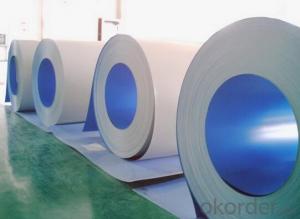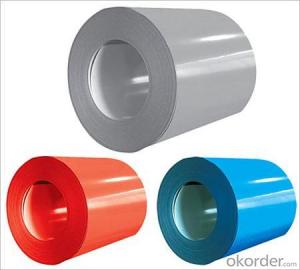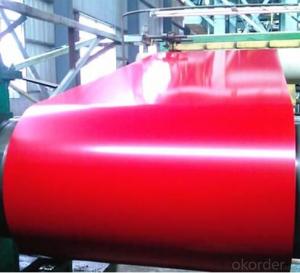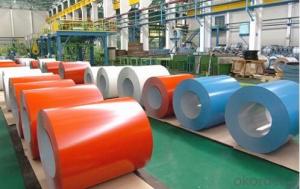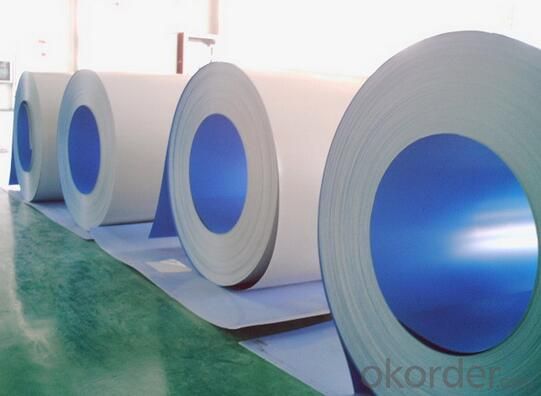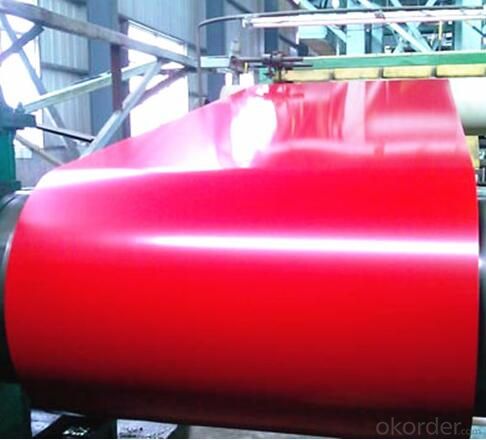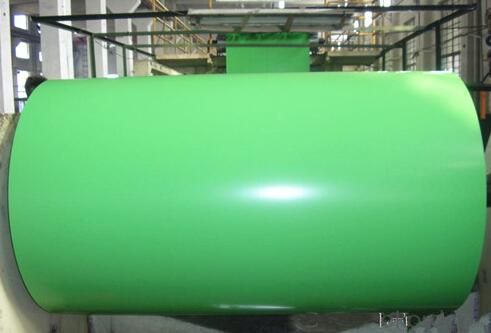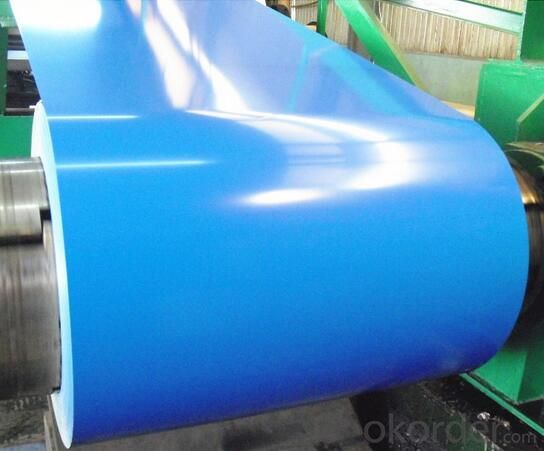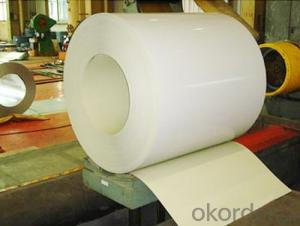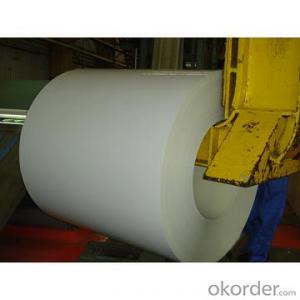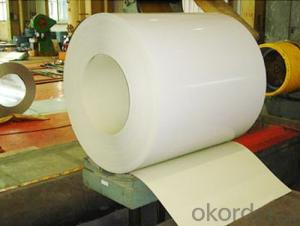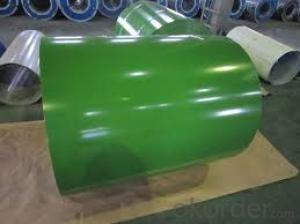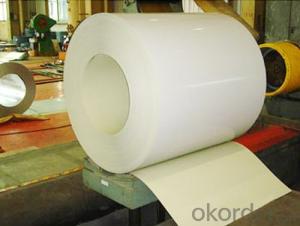PPGI Coils Color Coated Steel Coil RAL9002 White
- Loading Port:
- Tianjin
- Payment Terms:
- TT or LC
- Min Order Qty:
- 30 m.t.
- Supply Capability:
- 10000 m.t./month
OKorder Service Pledge
OKorder Financial Service
You Might Also Like
Specification
PPGI Coils Color Coated Steel Coil RAL9002 White
Details of PPGI Coils Color Coated Steel Coil RAL9002 White
Grade | DX51D, SGCC, CGCC |
Thickness | 0.15mm-1.5mm |
Width | 600mm-1500mm(914/1219/1250 are available) |
Standard | JIS G3312, ASTM,GB/T1275 |
Certificate | ISO9001.ISO14001.OHSAS18001 |
Length | As per requests |
Zinc Coating | 40g-275g/m2 |
Lacquer Coated | 20-25 microns/5-15 microns |
Coil ID | 508mm/610mm |
Coil Weight | normally 3-10mt or as your requirement |
Supply ability | 200,000Mt/year (MOQ:25Mt) |
Color | RAL No. |
Price terms | FOB,CFR,CIF |
Payment terms | L/C,T/T |
Deliver time | 30days after received deposit or L/C |
Packing | Standard exporting package |
steel strip Water proof paper, metal covers, | |
Application | Corrugated roofing,outside building, |
boating building,car producing | |
household appliance | |
Main market | Southeast Asia , the EU, Russia, Ukraine , Latin America and other countries and Regions |
Specification of PPGI Coils Color Coated Steel Coil RAL9002 White
Thickness | Width | Length of plate | Inner diameter of coil |
0.18-1.2mm | 800/914/1000/1200/1219/1250mm | 1000-6000mm | 508mm/610mm |
Coated Mass: | |||
Available Coated Mass(g/m^2) | Base plate | Available Coated Mass(g/m^2) | |
60,80, 100, 120, 160, 180 | Galvanized Steel | 60,80, 100, 120, 160, 180 | |
50, 70, 150 | Galvalume Steel | 50, 70, 150 |
Painting | Item | Code | |
Polyester | PE | ||
High-durability polyester | HDP | ||
Silicon modified polyesters | SMP | ||
Polyvinylidene fluoride | PVDF | ||
Easy-Cleaning | — | ||
Painting Thickness | Top side: 20±5microns; | ||
Bottom side: 5~7microns. | |||
Color System | Produce according to RAL Color System or as per buyer’s color sample. | ||
Painting structure | Top surface | Bottom surface |
|
Primer coating | No coating | 1/0 | |
Primer coating | Primer coating | 1/1 | |
Primer coating + Finish coating | No coating | 2/0 | |
Primer coating + Finish coating | Primer coating or single back coating | 2/1 | |
Primer coating + Finish coatin | Primer coating + Finish back coating | 2/2 | |
CNBM Introduction of PPGI Coils Color Coated Steel Coil RAL9002 White
CNBM International Corporation is the most import and export platform of CNBM group(China National Building Material Group Corporation) ,which is a state-owned enterprise, ranked in 270th of Fortune Global 500 in 2015.
With its advantages, CNBM International are mainly concentrate on Cement, Glass, Iron and Steel, Ceramics industries and devotes herself for supplying high quality series of refractories as well as technical consultancies and logistics solution.
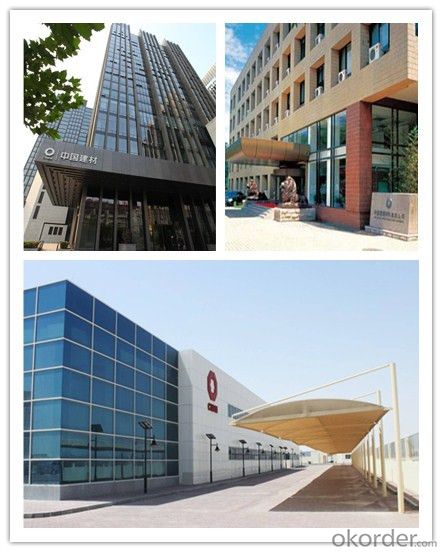
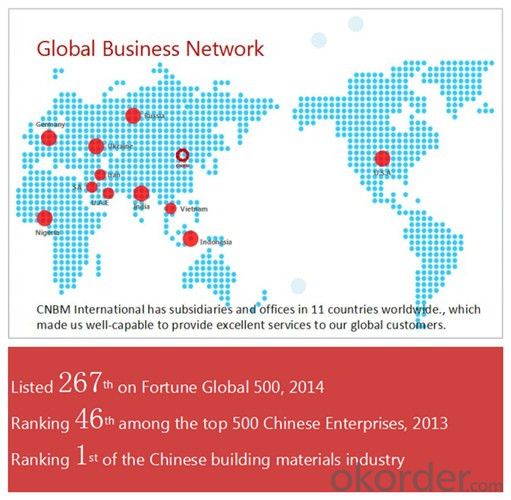
Packaging & Delivery of PPGI Coils Color Coated Steel Coil RAL9002 White
Packaging Detail | Sea worthy packing /as per customer's packing instruction |
Delivery Detail | 15 ~ 40 days after receiving the deposit |
Products Show
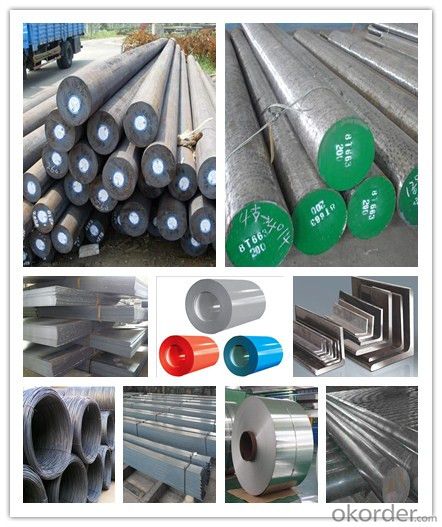
FAQ:
Are you a trading company or manufacturer? | Manufacturer |
What’s the MOQ? | 3 metric ton |
What’s your delivery time? | 15-35 days after downpayment received |
Do you Accept OEM service? | Yes |
what’s your delivery terms? | FOB/CFR/CIF |
What's the Payment Terms? | 30% as deposit,70% before shipment by T/T |
Western Union acceptable for small amount. | |
L/C acceptable for large amount. | |
Scrow ,Paybal,Alipay are also ok | |
Why choose us? | Chose happens because of quality, then price, We can give you both. Additionally, we can also offer professional products inquiry, products knowledge train (for agents), smooth goods delivery, excellent customer solution proposals. |
What's your available port of Shipment? | Main Port, China |
What’s your featured services? | Our service formula: good quality+ good price+ good service=customer's trust
|
Where are your Market? | Covering more than 160 countries in the world |
- Q: What are the main advantages of using special steel in the marine industry?
- The main advantages of using special steel in the marine industry are its high strength and durability, corrosion resistance, and ability to withstand extreme conditions. Special steel provides the necessary structural integrity to withstand the harsh marine environment, including exposure to saltwater, waves, and impact forces. It also offers excellent resistance to corrosion, which is crucial for maintaining the integrity and longevity of marine structures. Moreover, special steel's ability to withstand extreme temperatures and pressures makes it suitable for various marine applications, such as shipbuilding, offshore structures, and marine equipment.
- Q: Can special steel be used in the agricultural equipment manufacturing industry?
- Yes, special steel can be used in the agricultural equipment manufacturing industry. Special steel, which includes alloys such as stainless steel and high-strength steel, offers superior strength, durability, corrosion resistance, and heat resistance properties. These qualities make it suitable for various agricultural equipment components like plows, tillers, harvesters, and machinery parts. Special steel can enhance the performance and lifespan of agricultural equipment, ensuring that they can withstand the demanding conditions and rigorous use in the industry.
- Q: What are the requirements for special steel used in robotic applications?
- Special steel used in robotic applications must possess certain key requirements to ensure optimal performance and reliability. These requirements include: 1. High strength: Special steel for robotic applications needs to have excellent strength properties to withstand the stresses and loads encountered during robotic operations. It should offer superior tensile and yield strength to ensure structural integrity and prevent failure under heavy loads. 2. Wear resistance: The steel used in robotic applications should exhibit high wear resistance to withstand repetitive motions, sliding, and abrasive contact with different surfaces. This helps to minimize wear and tear, extending the lifespan of the robotic components. 3. Corrosion resistance: Robotic applications can often involve exposure to various environments, including moisture, chemicals, and other corrosive agents. Therefore, the special steel utilized should possess excellent corrosion resistance to prevent degradation and maintain performance over time. 4. Toughness: Special steel should have good toughness, enabling it to absorb energy and resist fracture or cracking. This is crucial to ensure that the steel can withstand sudden shocks or impacts without catastrophic failure, enhancing the safety and reliability of the robotic system. 5. Machinability: Robotic components often require complex shapes and precise dimensions. Therefore, the special steel used should have good machinability, allowing for easy cutting, shaping, and forming without excessive tool wear or difficulties in manufacturing. 6. Heat resistance: Robotic applications sometimes involve exposure to high temperatures, such as in welding or metalworking processes. It is important for the special steel to have good heat resistance to maintain its mechanical properties and structural integrity under elevated temperatures. 7. Magnetic properties: Certain robotic applications may require non-magnetic steel to prevent interference with electromagnetic sensors or systems. Therefore, special steel with low magnetic permeability is often preferred for such applications. By meeting these requirements, special steel used in robotic applications can provide the necessary strength, durability, and performance needed to facilitate efficient and reliable robotic operations in various industries, such as manufacturing, healthcare, and exploration.
- Q: How does special steel withstand high-velocity impacts?
- Special steel is able to withstand high-velocity impacts due to its exceptional strength and toughness. It is specifically engineered to have enhanced mechanical properties, such as increased hardness and resistance to deformation. This allows the steel to absorb and distribute the energy from the impact, minimizing the risk of fractures or failure. Additionally, special steel may be heat-treated or alloyed with other elements to further improve its impact resistance, making it an ideal choice for applications where high-velocity impacts are a concern.
- Q: How is special steel used in the chemical industry?
- Special steel is widely used in the chemical industry due to its excellent corrosion resistance properties. It is used to manufacture various equipment and components like storage tanks, pipes, valves, and reactors that come in contact with corrosive chemicals. Additionally, special steel's high strength and temperature resistance make it suitable for applications requiring robust and durable materials in chemical processing plants.
- Q: How does special steel contribute to improving product quality?
- Special steel contributes to improving product quality in several ways. Firstly, it offers superior strength and durability compared to regular steel, making it ideal for applications that require high performance and reliability. This ensures that products made with special steel will have a longer lifespan and reduced chances of failure, thereby enhancing overall quality. Additionally, special steel can be tailored to have specific properties like corrosion resistance, heat resistance, or magnetic properties, which are crucial in various industries such as automotive, aerospace, and medical. By using special steel, manufacturers can produce products that meet specific performance requirements, resulting in improved quality and customer satisfaction.
- Q: Can special steel be used in the electronics industry?
- Yes, special steel can be used in the electronics industry. It is commonly used for various components such as connectors, springs, and contacts due to its high strength, corrosion resistance, and electrical conductivity properties.
- Q: What are the specific requirements for special steel used in the railway sector?
- The specific requirements for special steel used in the railway sector are crucial for ensuring the safety, durability, and efficient operation of the railway infrastructure. Some of the key requirements include: 1. High strength: Special steel used in the railway sector must possess exceptional strength to withstand heavy loads, vibrations, and impacts. This is crucial for maintaining the structural integrity of tracks, bridges, and other components. 2. Wear resistance: Railway tracks and wheels experience significant wear due to continuous contact and friction. Special steel must have excellent wear resistance to minimize the need for frequent maintenance and replacement. 3. Fatigue resistance: The constant cyclic loading experienced by railway components demands high fatigue resistance in the steel. This allows them to withstand repetitive stress and prevents the occurrence of fatigue failures. 4. Corrosion resistance: Railway infrastructure is exposed to various environmental conditions, such as moisture, extreme temperatures, and chemicals. Special steel must possess good corrosion resistance to prevent rusting and degradation, ensuring a longer service life. 5. Heat resistance: In certain applications, such as rail joints and fasteners, special steel is subjected to high temperatures due to friction and stresses. The steel must have good heat resistance to maintain its mechanical properties under such conditions. 6. Weldability: Special steel used in the railway sector should have good weldability to enable efficient and reliable joining of components during manufacturing and maintenance processes. 7. Ductility and toughness: The steel must exhibit sufficient ductility and toughness to absorb energy and resist fracture in the event of a collision or impact, ensuring passenger safety. 8. Dimensional stability: Special steel used in the railway sector must maintain its dimensional stability under varying temperatures and loads to prevent deformation and ensure proper alignment of tracks and components. Meeting these specific requirements for special steel in the railway sector is essential for ensuring the safety, reliability, and longevity of railway infrastructure, contributing to the smooth operation of the entire transport network.
- Q: Can special steel be used in tool manufacturing?
- Yes, special steel can be used in tool manufacturing. Special steel refers to a category of steel that has specific properties and characteristics that make it suitable for various applications, including tool manufacturing. Special steel is often alloyed with other elements such as chromium, molybdenum, or vanadium to enhance its strength, hardness, and wear resistance. In tool manufacturing, special steel is commonly used for making cutting tools, drills, dies, molds, and other tooling components. Its high strength and hardness allow it to withstand the demanding conditions of cutting, drilling, and shaping various materials. Special steel also offers excellent resistance to wear, heat, and corrosion, making it ideal for tools that need to maintain their sharpness and performance over prolonged use. Moreover, special steel can be further processed and treated through heat treatment techniques such as quenching and tempering to achieve specific hardness levels and improve its overall performance. This versatility makes special steel a preferred choice for tool manufacturers who prioritize durability, precision, and longevity in their products. Overall, special steel has proven to be a reliable and efficient material in tool manufacturing, enabling the production of high-quality tools that meet the needs of various industries, from automotive and aerospace to construction and manufacturing.
- Q: How does special steel contribute to the renewable energy storage?
- Special steel plays a crucial role in renewable energy storage by enabling the production of high-performance components for energy storage systems. It is used in the manufacturing of batteries, such as lithium-ion batteries, which are widely utilized in renewable energy storage applications. Special steel provides the necessary strength, durability, and resistance to corrosion, ensuring the longevity and efficiency of these batteries. Additionally, special steel is essential for the construction of renewable energy infrastructure, including wind turbines and solar panel frames, which require sturdy and reliable materials to withstand harsh environmental conditions. Therefore, special steel contributes significantly to the development and advancement of renewable energy storage solutions.
Send your message to us
PPGI Coils Color Coated Steel Coil RAL9002 White
- Loading Port:
- Tianjin
- Payment Terms:
- TT or LC
- Min Order Qty:
- 30 m.t.
- Supply Capability:
- 10000 m.t./month
OKorder Service Pledge
OKorder Financial Service
Similar products
Hot products
Hot Searches
Related keywords
